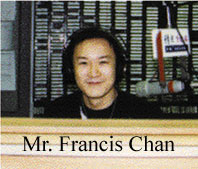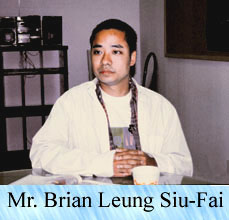Insiders reveal the pros and cons of being a DJ
By Shirley Lau
Riding on a horse, a jockey can exert control on the horse. “Riding on” music enables a disc jockey to have complete control over the choice of music, including the way to introduce and mix it. This is where the term “disc jockey” comes from.
To many people, being a disc jockey is fantastic — to play one’s favourite songs, to say what one wants to say and to be known, and perhaps adored, by the listeners.
 Mr. Francis Chan Kuen-Ho, a Chinese disc jockey who comes from Canada, has been working as a disc jockey for 5 years. He is now working at FM Select.
Mr. Francis Chan Kuen-Ho, a Chinese disc jockey who comes from Canada, has been working as a disc jockey for 5 years. He is now working at FM Select.
“I think the interesting side of being a disc jockey is to listen to different types of music. I’m given a lot of free CDs by many recording companies, but the quantity is so large that my home can’t accommodate all of them,” said Chan.
Nevertheless, Chan said that the job is boring at times. Sitting in the studio from 7 o’clock at night, Chan repeats the same job every night: receiving phone calls from his listeners, talking to them, playing the music they choose, inserting jingle and commercials in the programme.
“A disc jockey is lonely. When people go out to have fun, I have to stay in the studio by myself and talk to myself, which is boring. On a fine summer night, when most people are out and enjoying themselves, I don’t want to stay in the studio, but want to go out too. When I’m depressed, the studio is very much like a prison,” he explained.
According to Chan, the essential qualities of a good disc jockey include the ability to choose good music and to mix the music well, a sense of humour, a well-rounded character and knowledge of wide range of subjects.
Another disc jockey, Mr. Brian Leung Siu-Fai, the music director at Commercial Radio, said that a good disc jockey should be alert to what is going on in the world and keep pace with trends. Also, he or she should be creative. He noted that radio is a medium without visual elements, so creative ideas are very important to draw listeners’ attention.
“I think I’m a good disc jockey, since I’m quite creative, but I could do much better if I had more time to enrich my knowledge,” said Leung.
On the contrary, Chan is not satisfied with his performance. “I think I’m not a good disc jockey since I’m not well-rounded enough. As a disc jockey in Hong Kong, I should know Hong Kong better, but I don’t. Also, since I was brought up in Canada, I’m not good in Cantonese. Therefore I can’t express my points thoroughly. There’s really a lot of pressure to speak Cantonese in front of my listeners.”
Apart from the language problem that makes Chan feel frustrated, he is also upset by the unlucky things that happen to his listeners.
“When somebody calls up and says, ‘My grandfather died yesterday’, I feel really sad. It’s painful to get personally involved with the show. I try my best to pass on valuable bits to my listeners, hoping to ease their pain and make them feel better,” he said.
Disc jockeys are human beings, so when they have emotional problems, their performance at work may also be affected.
Said Mr. Hung Chui-Fung, a disc jockey at Radio Television Hong Kong who has been working in this field for more than 10 years: “It’s really hard for me to control my emotional problems. When I’m down, I speak less in my programme with a deep voice. Indeed, playing my favourite music is a way to release my sadness.”
Being the host of the phone-in programme “Midnight Zone”, Hung not only has to control his emotions, but also has to deal with his listeners’ problems.
“The techniques to do phone-in programme are to keep calm, be objective and be considerate, so that I can see listeners’ problems from different angles and give them advice. I try to let depressed people know that there is always hope in the world. This is also my belief,” he said.
Like many other professionals, a prospective disc jockey has to go through a series of training courses.
 According to Leung, newcomers have to undergo a 6-month training course. During the training period, they are taught the basic principles and techniques of running a programme, such as being responsible for what one says on air and pronouncing words accurately.
According to Leung, newcomers have to undergo a 6-month training course. During the training period, they are taught the basic principles and techniques of running a programme, such as being responsible for what one says on air and pronouncing words accurately.
What follows is the on-the-job training. This gives them a chance to run the programme and learn through practice and actual work.
Said Leung: “I think the on-the-job training is more important. A disc jockey can gain more experience and make full use of what is learnt in the course.”
In recent years, there have been times when Commercial Radio recruited new disc jockeys, and thousands of young people waited outside for auditions.
“I think the reason why young people want to become a disc jockey is that they think the job is easy and fun. They think a disc jockey simply plays music and says anything they like.
“Besides, disc jockeys can meet many famous artists and they perhaps might become superstars themselves in the future,” Mr. Leung explained.
Miss Ho Chi-Mei, 21, a salesperson at a record store, dreams of being a disc jockey. She applied to be a disc jockey at Commercial Radio two years ago.
“To become a disc jockey is my ideal. I enjoy talking to people and I love music very much. Besides, I could meet many superstars.
“For example my idol Andy Lau. So when Commercial Radio recruited new disc jockeys, I gave it a try to see if I could get a place there,” Ho said.
“I was surprised to see hundreds of young people waiting outside the radio station on the day of recruitment.
“During the audition, I was so nervous that I kept on stammering and got tongue-tied. It was such an embarrassing experience. As I expected, I failed the audition,” she said.
However, this failure did not stop her from wishing to be a disc jockey.
Said she: “I think I was not mature and well prepared then. I’m sure I will do better next time. Moreover, I’ve acquired much more knowledge about music after working in the record store.
“Now, I stand a better chance than before. I’m waiting for another audition.”
If Ho is to succeed in entering the field of radio broadcasting, perhaps she should take Leung’s advice.
“My advice for those who want to become disc jockeys is that they should make it clear what they want to say to the world. They should give positive messages to the public and have an optimistic attitude,” said Leung.
“I think a disc jockey is a mirror which reflects the things going on in our world to the public.
“If he or she loses sensitivity, the things they reflect become vague and dull. Then, he or she can no longer give any more messages or surprises to the public,” Leung added.

October 1996
